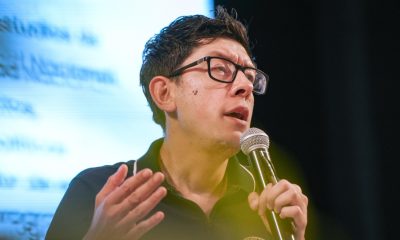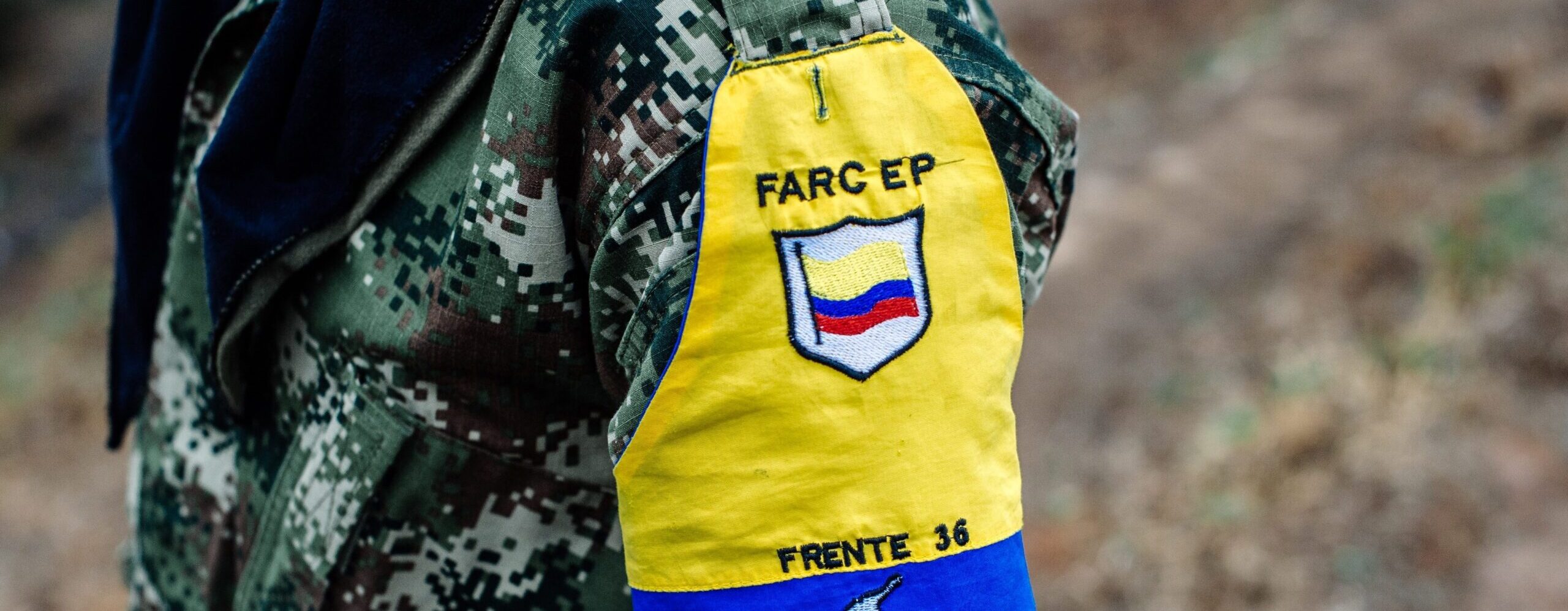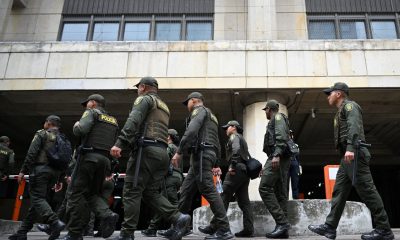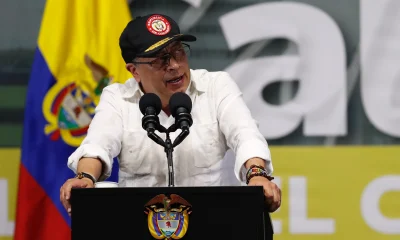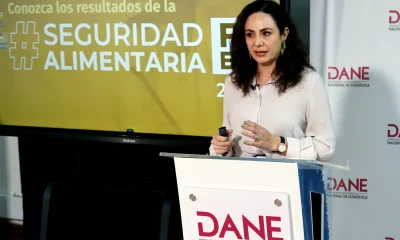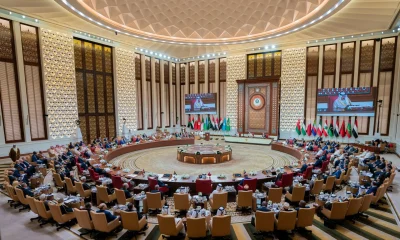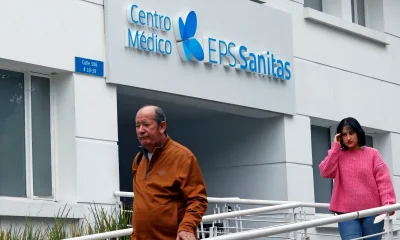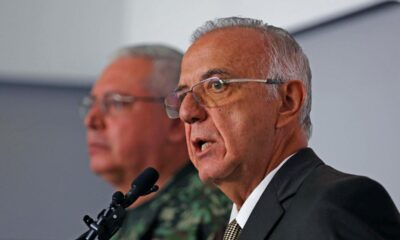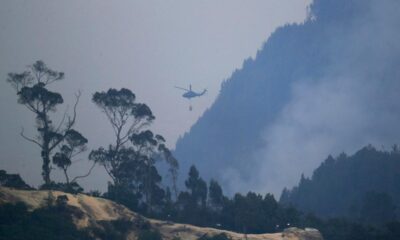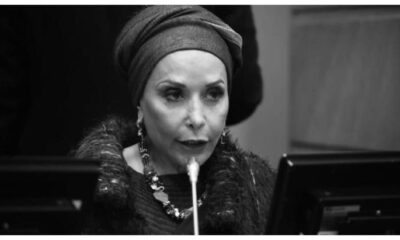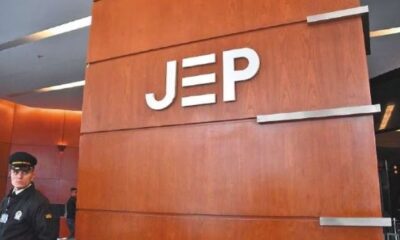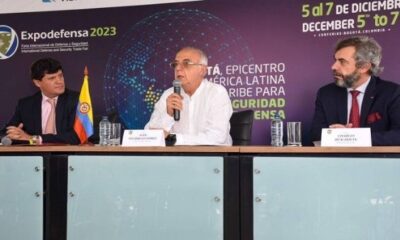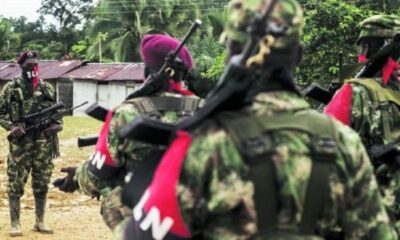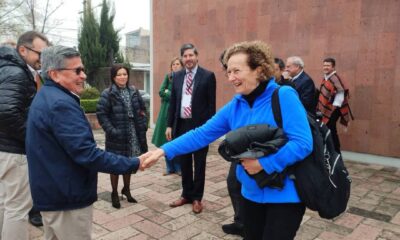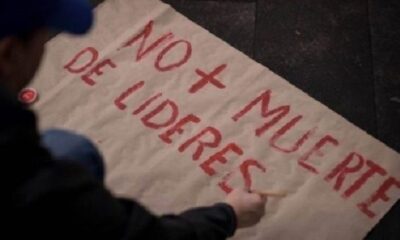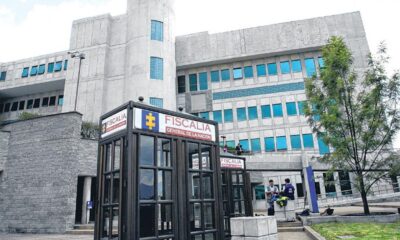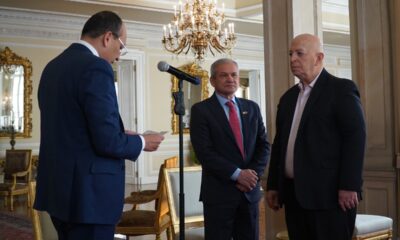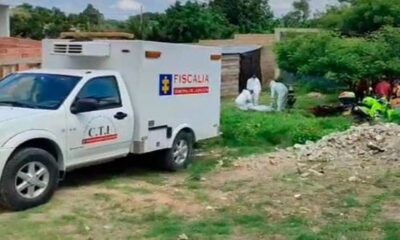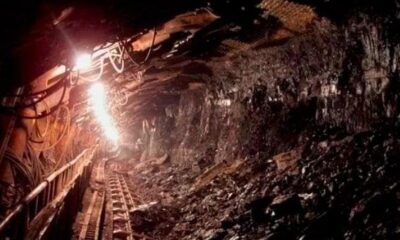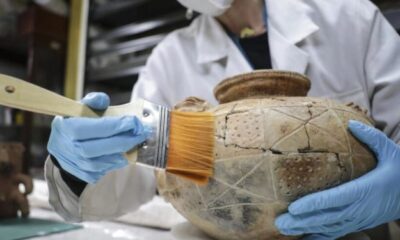International
Asking for permission to enter the house: the demand of Colombian indigenous people against Mennonites
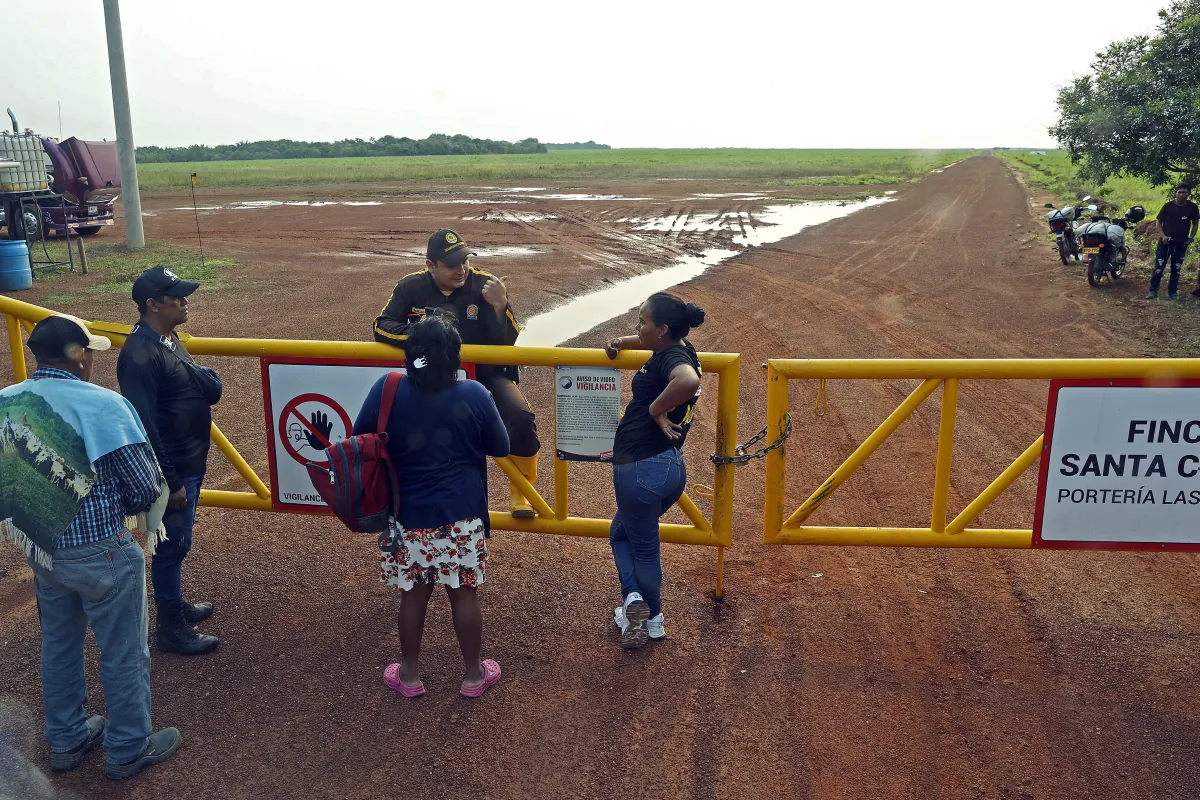
“Yesterday they returned us,” say the Sikuani indigenous authorities in front of the barrier that prevents them from entering their homes, waiting for authorization to continue, and denounce that their ancestral lands, in the Colombian department of Meta, are now owned by third parties who, they say, bought them irregularly.
On the Santa Catalina farm, owned by the meat company La Fazenda, they receive a refusal to pass by the entourage of journalists that accompanies them; they try their luck with the other entrance, that of the Mennonite ultra-religious community, which does authorize them to pass.
“Our grandparents are buried here,” says Jairo Ortiz in front of one of the sacred sites of the Sikuani, now in Mennonite territory.
“In times of violence they left here, they did not sell the land to anyone and left them thrown away, at that time other people who are not indigenous arrived and they took over,” says the captain, a position of authority of this semi-nomadad people displaced in several episodes of Colombian history.
In the Meta they lived until the so-called period of “violence”, which began in 1946, when they had to flee to the neighboring departments of Vichada and Guaviare. Then they returned but came back to persecution with the “guahibiadas” and “jaramilladas”, terms used to refer to the hunts of indigenous people to displace them from their lands and seize them.
A few years ago they returned to the land of their ancestors when the Colombian conflict lowered its intensity, but they realized that theirs was now in the hands of others, including the ultra-religious Mennite community that, coming from Mexico, found the promised land in the Colombian Oriental Plains.
The problem of land in Colombia is one of the great debts of the State; it is very difficult to know whose property each property is because many territories are not entitled.
Now, the 135 Sikuani families of this settlement claim their lands and denounce their appropriation and accumulation by foreigners.
The Mennonites, when they saw the potential of the Meta, hired a lawyer who advised them on the purchase of land, so “in principle” they are legal, explains Diana Quintero, a lawyer of the National Commission of Indigenous Territories, who accompanies the Sikuani in their lawsuit, explains to EFE.
The problem comes when the titles that the Mennonites bought are analyzed, awarded by the state National Land Agency because they were vacant of the nation.
The rule says the wastelands have to remain in the hands of their owner for a certain time, but those who were sold to the religious community did not meet this deadline and the indigenous peoples were not taken into account.
Another alleged irregularity, Quintero continues, is that the allocation of vacant lots has a limit of hectares, something called the Family Agricultural Unit (UAF), and the owners of these lands acquired more than allowed by law, incurring hoarding.
Quintero maintains that the Mennonites hoard because “although they say they are different families, they are part of a nucleus” and link all their lands in the same production process, exceeding the legal limit of UAF.
“Two years ago the Mennonites began to enter little by little. He could not be told anything because they have someone who supports them,” explains Alexander Álvarez, governor of the Iwitsulibo community, which brings together 80 families, in reference to the alleged alliances of the religious community.
According to the indigenous people, in the area there is the presence of paramilitaries of the Gaitanist Self-Defense of Colombia (AUC), allied with the Mennonites to provide them with security. They travel with motorcycles without a license plate and do not identify themselves, while all the Sikuani authorities report having received threats for their demands.
The Sikuani demand a total of 58,000 hectares to be distributed among the four communities and ask for a receipt to be made. Tsabilonia is the community that is closest to getting its claims, since it has been awarded – pending formalization – a territory in extinction of domain that belonged to drug traffickers, but they demand more hectares.
At the entrance of Tsabilonia the difference in the use of the land made by both communities is visible: on the Mennonite side there is not a single tree, only hectares waiting to be cultivated, and on the Sikuani side, pasture and native vegetation.
“They are pressuring us, we are being contaminated by foreign Mennonites who come from Germany, Canada and Mexico,” denounces Albarrubiela Gaitán, the traditional authority of the Barrulia territory: “We want to be calm in our territory, cultivating our uses and customs because as indigenous people we need our motherland to live in peace and freedom.”
The plantings of the Mennonites arrive almost at the door of the house of Albarrubiela; for the moment, the religious community continues to expand the agricultural border while the Sikuani expect the Colombian Justice to issue a decision on a land that went from hope to dispute.
International
Security Council to Hold Emergency Meeting on Middle East Crisis

UN Secretary-General António Guterres on Saturday condemned the “military escalation in the Middle East” following attacks by the United States and Israel against Iran and Tehran’s retaliatory strikes, just hours before an urgent meeting of the UN Security Council.
“I call for the immediate cessation of hostilities and de-escalation,” Guterres said in a statement.
The Security Council is scheduled to meet on Saturday at 21:00 GMT (4:00 p.m. in New York) to address “the situation in the Middle East,” the United Nations announced.
The meeting, during which Guterres will deliver remarks, was convened at the request of France, Bahrain, Colombia, Russia and China, according to a diplomatic source.
International
Trump Floats “Friendly Takeover” of Cuba Amid Rising Tensions

U.S. President Donald Trump said Friday that his administration is considering what he described as a “friendly takeover” of Cuba, as Washington continues to increase pressure on the island’s communist government.
“The Cuban government is talking to us and they have very serious problems, as you know. They have no money, they have nothing at this moment, but they are talking to us and maybe we will see a friendly takeover of Cuba,” Trump told reporters as he departed the White House for a trip to Texas.
Earlier in the week, U.S. Secretary of State Marco Rubio said Cuba needed a “radical change,” shortly after Washington eased restrictions on oil exports to the island for what officials described as “humanitarian reasons,” amid a deep economic crisis.
The United States has imposed an energy blockade on Cuba since January, citing what it calls an “extraordinary threat” posed by the communist-run island, located roughly 150 kilometers (90 miles) off the coast of Florida, to U.S. national security.
International
Argentina’s Senate Reviews Milei-Backed Labor Overhaul

Argentina’s Senate on Friday began reviewing the Labor Modernization Law promoted by the administration of President Javier Milei, a proposal that would significantly reshape labor rules across the country.
The upper chamber opened its final discussion of the contentious initiative, which revises the method used to calculate severance payments — lowering the amounts owed in dismissal cases — and introduces an “hour bank” mechanism that allows overtime to be offset with paid leave rather than extra wages.
The legislation also broadens the classification of essential services, a change that would place new limits on the right to strike in designated sectors.
The bill was initially approved by the Senate on February 11 and then moved to the Chamber of Deputies, where lawmakers passed it with amendments. It has now returned to the Senate for definitive approval.
Outside the Congress building in Buenos Aires, workers, trade unions and left-wing organizations staged demonstrations beginning at midday. The gathering later thinned out amid reports of disturbances and a strong police presence. Security forces had secured the area surrounding the legislature since early morning hours.
Union leaders contend that the reform weakens labor protections, while many business representatives back the measure but stress that sustainable formal employment will require economic expansion, improved credit conditions, greater investment and a more dynamic domestic market.
-

 International3 days ago
International3 days agoFamily of “El Mencho” Seeks Return of Body After Deadly Military Operation
-

 International3 days ago
International3 days agoLarry Summers Steps Down from Harvard Role Amid Epstein Controversy
-

 International3 days ago
International3 days agoIran’s President Optimistic Ahead of Geneva Nuclear Talks with U.S.
-

 International3 days ago
International3 days agoBill Gates Admits “Serious Mistake” Over Epstein Ties
-

 International3 days ago
International3 days agoStephen Hawking Photo Appears in Newly Released Epstein Documents
-

 International2 days ago
International2 days agoCocaine Production Surges 34% in 2023 as Market Expands into Africa and Asia
-

 International2 days ago
International2 days agoFederal Judge Blocks Trump Policy Allowing Deportations to Third Countries
-

 International1 day ago
International1 day agoTrump Floats “Friendly Takeover” of Cuba Amid Rising Tensions
-

 International2 days ago
International2 days agoClinton Accuses Republican Committee of Using Epstein Case to Shield Trump
-

 International1 day ago
International1 day agoArgentina’s Senate Reviews Milei-Backed Labor Overhaul
-

 International3 hours ago
International3 hours agoSecurity Council to Hold Emergency Meeting on Middle East Crisis
-

 Sin categoría3 hours ago
Sin categoría3 hours agoTrump: ‘We Think It’s True’ Amid Claims Iran’s Supreme Leader Was Killed































